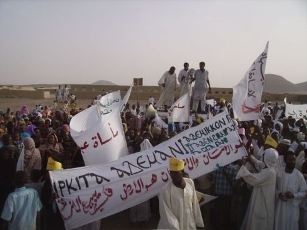“Foreign elements” detected in Sudan’s protests, official says
June 24, 2012 (KHARTOUM) – Sudanese authorities have detected the participation of “foreign elements” in the protests that have been spreading across the country, an official said on Sunday.
 The mayor of Khartoum locality, Lt-Gen Omer Ibrahim Nimir, told the pro-government website Sudanese Media Center (SMC), that foreigners from neighboring countries were seen participating in “the sabotage plot that is targeting the interests of citizens and the state.”
The mayor of Khartoum locality, Lt-Gen Omer Ibrahim Nimir, told the pro-government website Sudanese Media Center (SMC), that foreigners from neighboring countries were seen participating in “the sabotage plot that is targeting the interests of citizens and the state.”
Nimir said that a number of those participating in the unrest were arrested but released on bail after it was proven that they did not take part in the “sabotaging” while others were arraigned in courts for destroying properties of the state and individuals.
According to Nimir, a number of state buses and police trucks were destroyed while some people tried to loot banks and wedding halls.
The mayor went on to hail the efforts of security apparatus in foiling with what he termed as sabotage activities.
Sudanese authorities have been responding violently to the ongoing popular unrest against rising costs of living as it continues to grow in scale.
The protests were started on Sunday, 17 June, by students of Khartoum University ahead of plans by the government to end fuel subsidies as part of wider austerity measures to confront the country’s economic crisis.
Over the following days, the demonstrations spread to several parts of the capital and other towns with protesters from different segments of the population burning tires, blocking roads and chanting slogans denouncing increases in prices and calling for the downfall of the regime.
In a related context, the government-run Union of Sudanese Students (USS) denied rumors that the authorities are moving to close universities.
USS’s secretary-general Mohammed Salah Ahmad Hassan told SMC on Sunday that the rumors “spread by opposition parties” on plans to shut down universities are not true.
Ahmad accused opposition parties of trying to execute their agendas through inciting students to hold demonstrations he described as “limited”
(ST)
